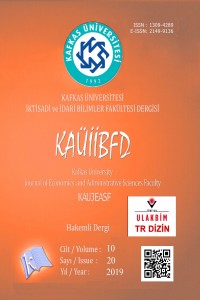YÜKSELEN EKONOMİLERDE ELEKTRİK TÜKETİMİNİN YENİLİK VE TEKNOLOJİ GÖSTERGELERİ KAPSAMINDA ANALİZİ
Öz
Bu çalışmada 2000-2018 dönemi için gelişmekte olan ülkelerde patent başvuru sayısı, kişi başına Ar-Ge harcaması, mobil hat abone sayısı ve internet kullanıcı sayısı gibi yenilik ve teknoloji göstergelerinin kişi başına elektrik tüketimine olan etkileri ampirik olarak incelenmektedir. Tahminlerdeki otokorelasyon ve değişen varyans sorunları Arellano-Bond (1991) yöntemi ile çözülmüştür. Nihai sonuçlar kişi başına Ar-Ge harcaması, mobil hat abone sayısı ve internet kullanıcı sayısındaki %10’luk artışların kişi başına elektrik tüketimini sırasıyla %0.4, %0.1 ve %0.3 artıracağını göstermiştir. Ancak patent başvuru sayısının kişi başına elektrik tüketimi üzerinde anlamlı bir etkiye sahip olmadığı görülmüştür. Bu bulgular gelişmekte olan ülkeler için elektrik verimliliği politikalarına olan ihtiyaca işaret ediyor olabilir.
Kaynakça
- Aflaki, S., Basher, S. A. & Masini, A. (2014). Does Economic Growth Matter? Technology-Push, Demand-Pull and Endogenous Drivers of Innovation in the Renewable Energy Industry (December 1, 2014). HEC Paris Research Paper No. MOSI-2015-1070. DOI: http://dx.doi.org/10.2139/ssrn.2549617
- Afzal, M. N. I., & Gow, J. (2016). Electricity consumption and information and communication technology (ict) in the n-11 emerging economies. International Journal of Energy Economics and Policy, 6(3), 381-388.
- Arellano, M., & Bond, S. (1991). Some tests of specification for panel data: Monte Carlo evidence and an application to employment equations. Review of Economic Studies, 58: 277-297.
- Baum, C. F. (2001). Residual diagnostics for cross-section time series regression models. The Stata Journal, 1(1), 101-104.
- Bayraktutan, Y., Uçak, S., & Bicil, İ. M. (2012). Yükselen Piyasalarda Elektrik Tüketimi büyüme ilişkisi: Nedensellik Analizi. Çukurova Üniversitesi Sosyal Bilimler Enstitüsü Dergisi, 21(1), 241-254.
- Begum, R. A., Sohag, K., Abdullah, S. M. S., & Jaafar, M. (2015). CO2 emissions, energy consumption, economic and population growth in Malaysia. Renewable and Sustainable Energy Reviews, 41, 594-601.
- Billor, N., Hadi, A. S., & Velleman, P. F. (2000). BACON: Blocked adaptive computationally efficient outlier nominators. Computational Statistics & Data Analysis 34: 279-298.
- Brookes, L.G. (1992) Energy efficiency and economic fallacies: A reply. Energy Policy, 20, 390–392.
- Drukker, D. M. (2003). Testing for serial correlation in linear panel-data models. The Stata Journal (3)2, 1-10.
- Dünya Bankası (2019). Dünya Gelişmişlik Göstergeleri. htts://databank.worldbank.org/data/reports.aspx?source=world-development-indicators. Erişim Tarihi: 14.01.2019.
- Fei, Q., & Rasiah, R. (2014). Electricity consumption, technological innovation, economic growth and energy prices: does energy export dependency and development levels matter?. Energy Procedia, 61, 1142-1145.
- Greene, W. (2000). Econometric Analysis. New York:Prentice-Hall.
- Hausman, J. A. (1978). Specification tests in econometrics. Econometrica 46: 1251–1271.
- IMF (2015). World Economic Outlook, Adjusting to Lower Commodity Prices. http://www.imf.org/external/pubs/ft/weo/2015/02/pdf/text.pdf. Erişim Tarihi: 11.02.2019.
- IEA (2013), World Energy Outlook. OECD/WEO. Paris.
- Irandoust, M. (2016). The renewable energy-growth nexus with carbon emissions and technological innovation: Evidence from the Nordic countries. Ecological Indicators, 69, 118-125.
- Ishida, H. (2015). The effect of ICT development on economic growth and energy consumption in Japan. Telematics and Informatics, 32(1), 79-88.
- Jin, L., Duan, K., & Tang, X. (2018). What Is the Relationship between Technological Innovation and Energy Consumption? Empirical Analysis Based on Provincial Panel Data from China. Sustainability, 10(1), 145.
- Kaya, M. V., Doyar, B. V., & Demir, F. (2017). The Effects of Internet Usage and GDP on Electricity Consumption: The Case of Turkey. Yönetim ve Ekonomi: Celal Bayar Üniversitesi İktisadi ve İdari Bilimler Fakültesi Dergisi, 24(1), 185-198.
- Khazzoom, J. D. (1987). Energy saving resulting from the adoption of more efficient appliances. The Energy Journal, 8(4), 85-89.
- Sadorsky, P. (2012). Information communication technology and electricity consumption in emerging economies. Energy Policy, 48, 130-136.
- Salahuddin, M., & Alam, K. (2015). Internet usage, electricity consumption and economic growth in Australia: A time series evidence. Telematics and Informatics, 32(4), 862-878.
- Tang, C. F., & Tan, E. C. (2013). Exploring the nexus of electricity consumption, economic growth, energy prices and technology innovation in Malaysia. Applied Energy, 104, 297-305.
- Tunalı H., & Ulubaş M.A. (2017). Elektrik Enerjisi Tüketimi ve Ekonomik Büyüme Arasındaki İlişki: G7 Ülkeleri Üzerine Bir Uygulama (1970-2015) Selçuk Üniversitesi Cilt 20 Sayı 1 Sosyal Bilimler Meslek Yüksekokulu Dergisi (E-Issn: 2564-7458)
- Wooldridge, J. M. (2002). Econometric Analysis of Cross Section and Panel Data. Cambridge, Massachusetts:The MIT Press.
- Yuan, C., Liu, S., & Wu, J. (2009). Research on energy-saving effect of technological progress based on Cobb–Douglas production function. Energy Policy, 37(8), 2842-2846.
Ayrıntılar
| Birincil Dil | Türkçe |
|---|---|
| Bölüm | Makaleler |
| Yazarlar | |
| Yayımlanma Tarihi | 31 Aralık 2019 |
| Kabul Tarihi | 21 Kasım 2019 |
| Yayımlandığı Sayı | Yıl 2019 Cilt: 10 Sayı: 20 |
KAÜİİBFD, Kafkas Üniversitesi İktisadi ve İdari Bilimler Fakültesi Dergi Yayıncılığı'nın kurumsal dergisidir.
KAÜİİBFD 2022 yılından itibaren Web of Science'a dahil edilerek, Clarivate ürünü olan Emerging Sources Citation Index (ESCI) uluslararası alan endeksinde taranmaya başlamıştır.

